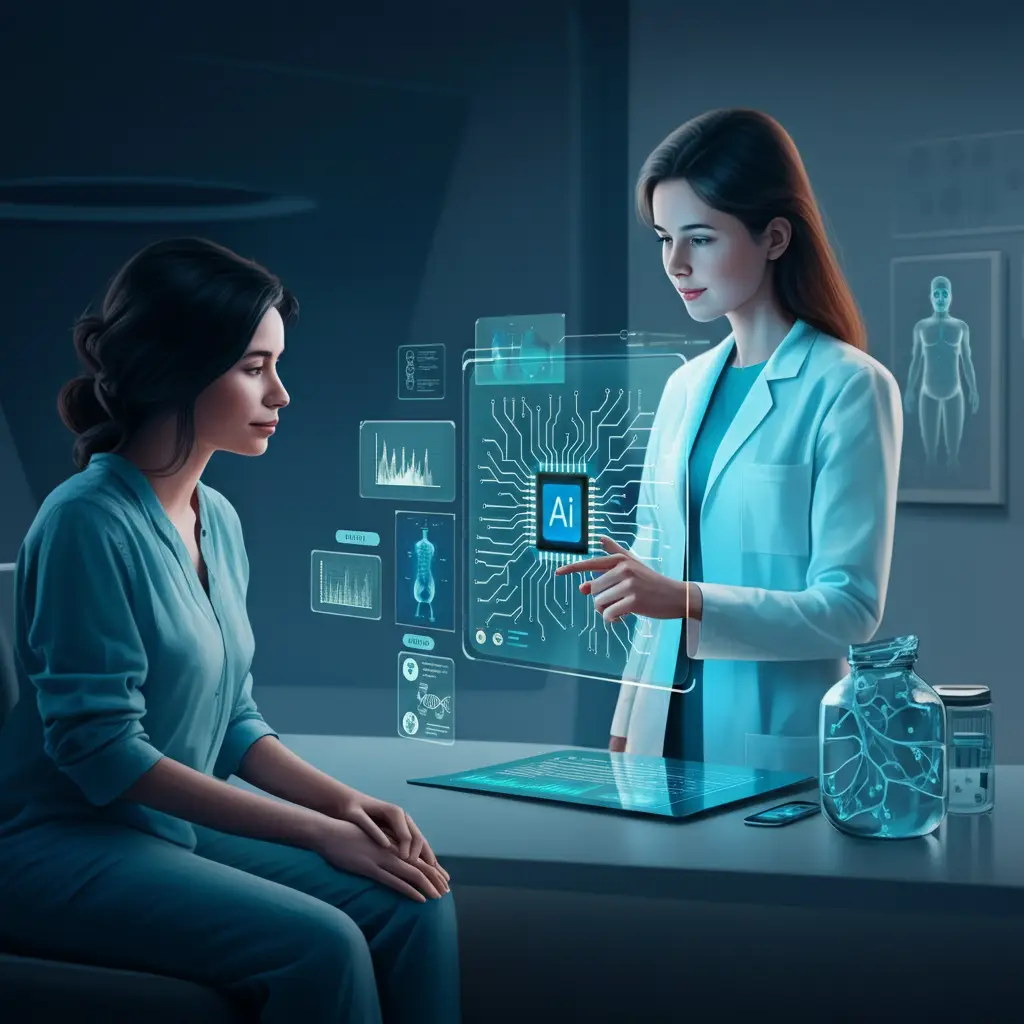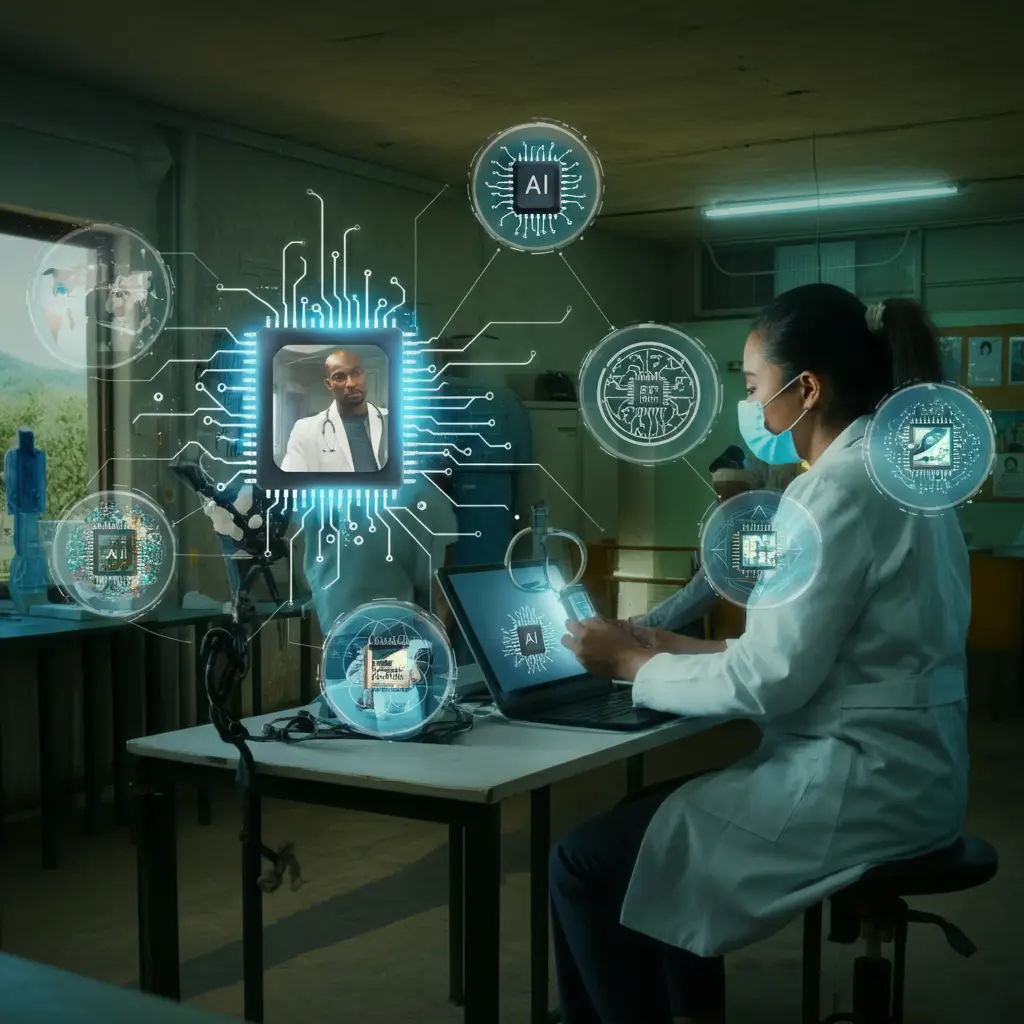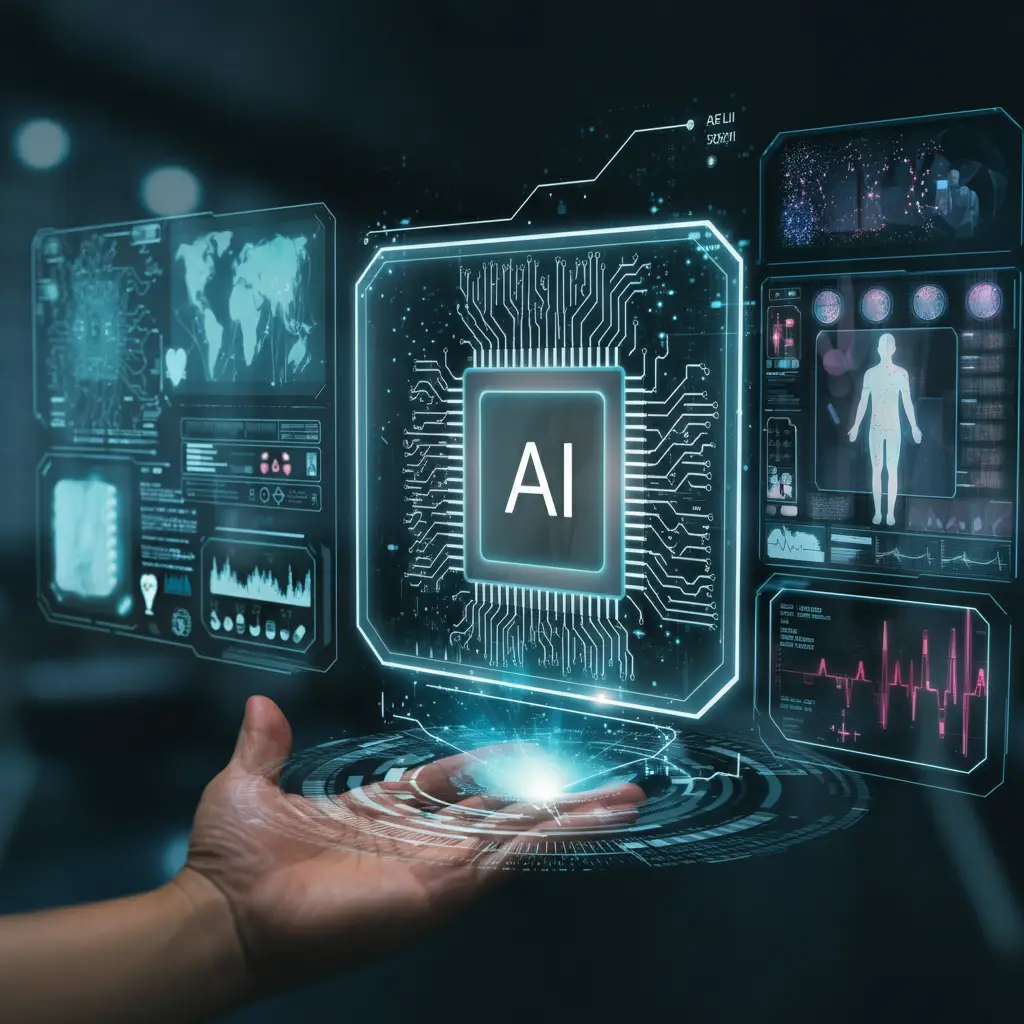Advances in artificial intelligence (AI) are sparking a profound transformation in healthcare, a field long defined by its reliance on human expertise, intuition, and innovation. Today, AI is revolutionizing how we diagnose diseases, discover treatments, and personalize patient care. This technological surge is reshaping healthcare systems worldwide, offering solutions to some of medicine’s most persistent challenges.
From AI-powered tools that analyze medical images with pinpoint accuracy to algorithm-based systems capable of drug discovery in record time, the application of AI spans across fields. What makes AI remarkable in healthcare is not only its capacity to process vast quantities of data but its potential to amplify human capabilities, providing a level of insight and efficiency that was previously unimaginable. However, as AI continues to embed itself within healthcare ecosystems, it also introduces challenges that demand attention—ranging from ethical concerns to the risk of overdependence on machines.
This article highlights the breakthroughs, real-world applications, and the ripple effect these advancements are having on the healthcare sector. It also explores the growing pains of AI in healthcare and its revolutionary potential in shaping the future of medicine.
Introduction to Artificial Intelligence in Healthcare
Artificial intelligence (AI) is a rapidly growing field that has the potential to revolutionize the way healthcare is delivered. AI in healthcare refers to the use of artificial intelligence and machine learning algorithms to analyze and interpret healthcare data. AI can help healthcare providers make more accurate diagnoses, develop personalized treatment plans, and improve patient outcomes.
Definition and Types of AI in Healthcare
AI in healthcare can be defined as the use of computer algorithms to analyze and interpret healthcare data. There are several types of AI in healthcare, including machine learning, deep learning, and natural language processing. Machine learning is a type of AI that uses data to train algorithms to make predictions or decisions. Deep learning is a type of machine learning that uses neural networks to analyze complex data. Natural language processing is a type of AI that enables computers to interpret and use human language.
Benefits of AI in Healthcare
The benefits of AI in healthcare are numerous. AI can help improve patient outcomes by providing personalized treatment plans and improving disease diagnosis. AI can also help reduce healthcare costs by streamlining clinical workflows and improving operational efficiency. Additionally, AI can help improve patient safety by identifying potential errors and adverse events.
The Role of AI in Medical Imaging

Medical imaging has long been integral to diagnosing diseases, but its analysis remains a time-intensive and skill-dependent process. AI is transforming clinical practice by streamlining clinical workflows and enhancing patient care. With AI, scanning and analyzing images is being revolutionized, enabling faster and more accurate diagnoses. Healthcare professionals can leverage AI to improve patient outcomes by enhancing diagnostic accuracy and managing the complexities of modern healthcare.
Breakthrough Machine Learning Tools in Imaging
Recent advancements in AI have produced tools that excel at interpreting medical images such as X-rays, MRIs, and CT scans.
Google DeepMind’s AI for Ophthalmology
DeepMind developed an AI system capable of diagnosing over 50 eye diseases using scans that ophthalmologists rely on. The tool matches expert-level accuracy, rapidly identifying conditions like diabetic retinopathy and retinal detachment—a significant boost for early intervention efforts.Zebra Medical Vision
Zebra’s AI-powered software analyzes radiological images to detect conditions like lung cancer, liver disease, and bone fractures. The platform reduces diagnostic errors and allows physicians to focus their attention on complex cases.Aidoc
Another key player in imaging AI, Aidoc’s platform assists radiologists by detecting abnormalities in medical scans in real-time. Its application in stroke detection has saved time in emergencies, accelerating treatment decisions that can mean the difference between recovery and permanent injury.
Impact on Diagnostic Accuracy and Efficiency
AI technologies in imaging not only enhance diagnostic accuracy but significantly improve speed. Radiologists now use these tools as “co-pilots,” reviewing AI-flagged areas of concern while reducing workload. The result? Faster diagnoses, earlier disease detection, and better patient outcomes.
AI in Clinical Applications
AI is being used in various clinical applications, including diagnostics, decision-making, and care.
AI in Diagnostics: Computer Vision and Deep Learning
AI is being used in diagnostics to improve the accuracy and speed of diagnosis. Computer vision and deep learning are being used to analyze medical images, such as X-rays and MRIs, to detect diseases such as cancer. AI algorithms can analyze medical images with greater accuracy and speed than human radiologists, often detecting diseases at earlier stages. Additionally, AI can help reduce the risk of human errors and provide more accurate results in less time.
Accelerating Drug Discovery with AI

The traditional process of discovering new drugs is arduous and expensive, often taking upwards of a decade and billions of dollars in investment. The drug development process is being transformed by AI’s role in analyzing extensive genomic data and clinical parameters, significantly enhancing various stages of drug discovery, including predicting drug efficacy and toxicity.
AI is drastically shortening this timeline by uncovering drug candidates and optimizing pathways for clinical trials. Advancements in synthetic biology and AI technologies are revolutionizing the drug discovery process, improving data accessibility and predictive capabilities, which enhances efficiency in developing new therapies, ultimately reducing costs and increasing the likelihood of successful drug development.
Key Success Stories
Insilico Medicine
Insilico Medicine used an AI system to identify a novel drug target for idiopathic pulmonary fibrosis, a chronic lung disease. What’s remarkable is that this was achieved in just 18 months—a process that traditionally would have taken years.BenevolentAI
During the COVID-19 pandemic, BenevolentAI used its platform to identify existing drugs that could potentially treat the virus. Its AI systems suggested the rheumatoid arthritis drug Baricitinib, which was later authorized for emergency use in fighting severe COVID-19 cases.Atomwise
Known for its pioneering use of AI in molecular analysis, Atomwise specializes in identifying drug potentials. Its AtomNet platform leverages deep learning to predict how molecules will bind to targets, streamlining early drug discovery.
Impact on Healthcare Systems
By cutting down research time and costs, AI is enabling pharmaceutical companies to bring innovative treatments to market faster. This efficiency is particularly vital for tackling rare diseases or responding to global health crises like pandemics.
Personalized Medicine and Tailored Care

AI is laying the groundwork for personalized medicine, enabling treatments designed specifically for an individual’s unique genetic makeup, lifestyle, and medical history. By analyzing various data factors, AI can identify patients at higher risk for certain conditions, allowing for targeted interventions and preventative measures. This approach marks a departure from the “one-size-fits-all” mentality that has largely dominated healthcare. Healthcare organizations play a crucial role in implementing AI for personalized care, addressing issues such as ethical considerations, data privacy, and effective integration with existing systems.
AI in Genomic Analysis
One of the cornerstones of personalized medicine is genomics—the study of a patient’s genes. AI tools are now analyzing genetic data at unprecedented speeds, identifying predispositions to diseases and matching patients with effective treatment options.
IBM Watson Health
Watson analyzes vast datasets to recommend tailored cancer treatments. It evaluates medical literature, patient records, and genetic data to pinpoint therapies that align most closely with the patient’s profile.Grail
Grail’s Galleri test is an AI-driven blood test designed to detect over 50 cancers through genetic material shed by tumors. Early-stage detection has the potential to save millions of lives.
Wearable AI in Personalized Care
AI-integrated wearables like Fitbit, Apple Watch, and Biospectal are extending personalized care into daily life. These devices continuously monitor health markers such as heart rate, oxygen levels, and sleep patterns, empowering patients and doctors alike to spot early warning signs.
Impact on Patient Outcomes
By understanding individual variability, AI ensures that patients receive the most effective treatments, minimizing trial-and-error approaches. This results not only in better outcomes but also in reduced healthcare costs associated with prolonged ineffective treatments.
Real-World Applications Revolutionizing Healthcare Systems

The integration of AI is already creating profound ripple effects across healthcare systems globally. AI enhances the management and documentation of patient visits within electronic health records, streamlining administrative tasks and allowing clinicians to focus more on patient care.
Emergency CareAI is being used to triage patients based on urgency in emergency rooms. Systems like Corti leverage natural language processing (NLP) to analyze emergency calls, detecting signs of cardiac arrest faster than human dispatchers.
Chronic Disease ManagementHealthcare providers are using AI to monitor chronic conditions like diabetes. Digital health platforms calculate risk scores using real-time data, empowering patients to manage their conditions with tailored plans.
TelemedicineAI chatbots and virtual assistants are increasingly employed in telehealth platforms to guide patients, answer preliminary questions, or identify when to escalate cases for human consultation.
Global ExpansionOrganizations like Microsoft’s AI for Health initiative are developing tools aimed at underserved regions. AI-powered ultrasound machines enable lower-cost imaging, benefiting rural communities lacking specialist access.
The transformative impact of AI on patient care within the healthcare sector is undeniable, necessitating collaboration between researchers and practitioners to address challenges such as data privacy and the development of comprehensive policies.
Challenges and Ethical Considerations
Data Quality and Bias
AI models heavily depend on data quality, and bias within training datasets can perpetuate inequalities. For instance, if a model overrepresents certain demographics, it may yield less accurate diagnoses for underrepresented populations. Ensuring diverse data inputs is critical.
Data Security and Privacy
The accumulation of sensitive patient data exposes healthcare systems to cybersecurity threats. Robust encryption and transparent consent processes must underpin AI-based health solutions to maintain public trust.
Regulatory Oversight and Accountability
Healthcare is among the most regulated industries globally, meaning that AI deployments must pass stringent approvals. Who takes responsibility when an AI system errs—a technician? A manufacturer? These concerns necessitate clear guidelines.
The Human Touch
While AI creates efficiencies, there’s concern that over-reliance on algorithms could depersonalize patient care. Successfully integrating AI requires maintaining the human element—empathy, intuition, and patient understanding—at the core of medicine.
Future Potential of AI in Healthcare
There is no question that AI holds immense promise for the future of healthcare. Healthcare organizations play a crucial role in integrating AI technologies, addressing challenges such as ethical considerations, data privacy, and effective system integration to improve patient care and operational efficiency. Key areas of potential development include:
Predictive HealthcareAI-powered predictive models could forecast disease outbreaks by analyzing global health data patterns, enabling early-prevention strategies.
Surgical AutomationAI-enhanced robots, like Medtronic’s Hugo, are poised to perform minimally invasive surgeries with precision, reducing human error and speeding patient recovery.
AI-Powered Health EquityWith wider access to affordable AI tools, underserved populations could access diagnostics and treatments on par with wealthier regions, narrowing global healthcare disparities.
Accelerating InnovationBy continuing to streamline R&D processes, AI will open doors to previously impossible therapies, including gene editing for inherited diseases. Collaboration between researchers and practitioners within the healthcare sector is essential to ensure AI developments meet clinical needs while addressing significant challenges such as data privacy and the necessity for comprehensive policies.
Final Thoughts
AI has undeniably revolutionized healthcare, elevating diagnostic accuracy, accelerating treatment discovery, and personalizing medicine. The transformative impact of AI on patient care within the healthcare sector is profound, necessitating essential frameworks for its ethical integration. From early cancer detection to advances in rare disease studies, the results are life-changing. However, this transformation must be accompanied by ethical vigilance, robust governance, and a commitment to patient-centered care.
The future of AI in healthcare will not just be about machines serving humanity—it will be a partnership. With the right balance, artificial intelligence could pave the way for a world where the healthcare system is both more innovative and more inclusive, ensuring a healthier future for all.
